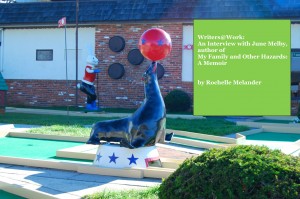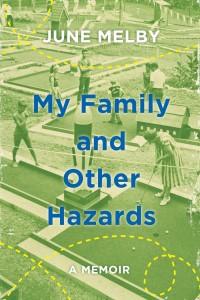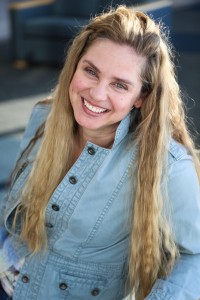Writers@Work Interview with June Melby by Rochelle Melander
 Around my birthday, I wandered into my favorite Indie bookstore, Boswell Book Company (just blocks from my house!) and looked for a signed copy of The Storied Life of A.J. Fikry by Gabrielle Zevin. I’d been eying it for weeks, waiting for an opportunity to treat myself. But I’d waited too long—they were sold out.
Around my birthday, I wandered into my favorite Indie bookstore, Boswell Book Company (just blocks from my house!) and looked for a signed copy of The Storied Life of A.J. Fikry by Gabrielle Zevin. I’d been eying it for weeks, waiting for an opportunity to treat myself. But I’d waited too long—they were sold out.
Boswell owner Daniel Goldin took pity on me and handed me June Melby’s new book, My Family and Other Hazards: A Memoir. I loved it! Melby’s book turned out to be a funny and poignant dive into family life and miniature golf courses. Plus, it’s set in Wisconsin. I grew up here, playing miniature golf while fighting enormous mosquitoes. Today I’m delighted to interviewing the author of My Family and Other Hazards, June Melby. Welcome, June!
Talk a bit about your background as a performer. What did your work as a performer teach you about writing?
I moved to California to become a “rich and famous rock musician”—and I put that in quotes because that’s what I really told people. I was very determined. I landed in San Francisco with no job, no connections, $1300, and my grandfather’s accordion. What I discovered: it was terrifying. But of course, I didn’t anticipate that, I was incredibly naïve. So maybe the first thing I learned was how not to panic. Ha. I’m joking, but honestly, finishing a book takes a lot of courage. And maybe that’s a good lesson to learn when you are a writer. You’ve got to build it up somewhere!
I switched over to standup comedy shortly thereafter, and wrote funny songs. I loved doing standup and the other comics were great people—all writers. All very idealistic. Ten years later, I got sucked into performing poetry—the performance was very similar, but the audiences were different and had different expectations. I performed at national poetry slams and on toured quite a few times in Europe. It was wonderful experience. What you learn from performing is timing, which is not just about pauses, but about word choice and syllables. You learn how to use exactly the right number of words, no more, no less. A very good lesson.
 What a fun book! Was it the sale of Tom Thumb that inspired you to write this story now…or something else? And how did you get your family to agree to it?
What a fun book! Was it the sale of Tom Thumb that inspired you to write this story now…or something else? And how did you get your family to agree to it?
I’ll answer the second part of the question first…. Agree to it? Were they supposed to agree to it? Hmm…. That’s interesting. Don’t tell them that they could have chosen to opt out!
But what inspired me…well, yes, the sale. I was 40 years old and living in Hollywood when I got the phone call with the news that my parents had sold the miniature golf course which had been in my family for 30 years. And I will never forget where I was when I got that call –it shook me up that much. It was a hand-built course dating from 1959. It had been around for almost 50 years, and I suddenly appreciated the beauty of that. It was a piece of folk-art, and loved by so many generations of tourists. Apparently, in the back of my mind, I had assumed I would get rich and then return to the Midwest and take over the business. So during the final days of that last summer, I lingered at Tom Thumb and took pages and pages of notes. I tape recorded conversations and interviewed everybody. I knew that some day in the future that I would have to write a book about it. Because I was the only writer in my family, I felt this great responsibility to tell the story. But I didn’t plan on doing it right away. I was a poet. I had never written anything longer than half a page; I had never taken a writing class. I just figured that some day, maybe twenty years down the line, I would somehow feel capable. I was going to wait until the day, when I might feel confident. During graduate school at the University of Iowa, the story started coming out, and then I couldn’t stop it. The only way to save Tom Thumb was to capture it on the page.
What books inspired and instructed you as you wrote My Family and Other Hazards?
Well, first I need to give a nod to My Family and Other Animals by Gerald Durrell. Obviously I liked the book—I stole the title! It’s about an eccentric English family living in Greece. Nothing tragic happens, and yet as a reader you are totally engrossed. That takes great writing!
I hugely admire Marilynne Robinson’s Housekeeping, Kevin Brockmeier’s The Truth About Celia, which is a novel told in short stories. And The Mezzanine by Nichoson Baker, which gives you permission to consider the importance of our ordinary lives.
What is your daily writing practice?
I’m on tour right now, so I’m craving a daily writing practice, the way you crave your favorite cup of coffee when you’re away from home and have to settle for motel-brew… But I will say this, I’m a firm believe in making yourself sit there. The biggest challenge is just getting yourself into that chair. When I start my writing day I really love opening up a blank page and just typing. Anything. I love a blank page. It’s fun because I know it “doesn’t count.” Sometimes my daily warm-up will really be just random garbage—quite literally—but sometimes halfway down the page, it will reveal itself to be a short story or short fairy tale or weird-ass poem. It’s how I have fun. It entertains me. Starting out this way helps me remember who I am, creatively speaking, before I get to work on the thing I am “supposed” to be writing. I save these warm-ups in a file I call “Raw pieces,” and never look at them again. But you’ve got to have fun! But I love a blank page.
What are you working on now?
My next book will be a collection of short fiction I have written over the last ten years, some of which has been published, others from my early days of prose. I was terrified when I first started writing stories. But when I look at the early ones now, I realize how free they were—maybe it’s easier to be free before you have any idea what you’re doing. Now that my memoir is done, I am really enjoying the chance to dig through these old documents, and the file of “Raw stories” I have saved over the years. It is like opening up boxes in the attic and finding treasures you had forgotten about. The next book after that will be a memoir will be about my years in standup comedy, tentatively titled, Bombing.
Boswell Book Company Appearance. June Melby will read from her book at Boswell Book Company on Tuesday, July 22nd at 7:00 PM. Hope to see you there!
About June Melby. Her work has appeared in McSweeney’s, LA Weekly, and National Lampoon Magazine, among other places. In 2011, June Melby was a Writing Fellow at the Virginia Center for the Creative Arts, and in 2003 received the International Artist Award and residency from the City of Hamburg Kulturbehorde (Cultural Affairs Department). In 2002 she was the winner of the Children’s Poetry Award at the Edinburgh International Poetry Festival. She lives in Decorah, Iowa.









